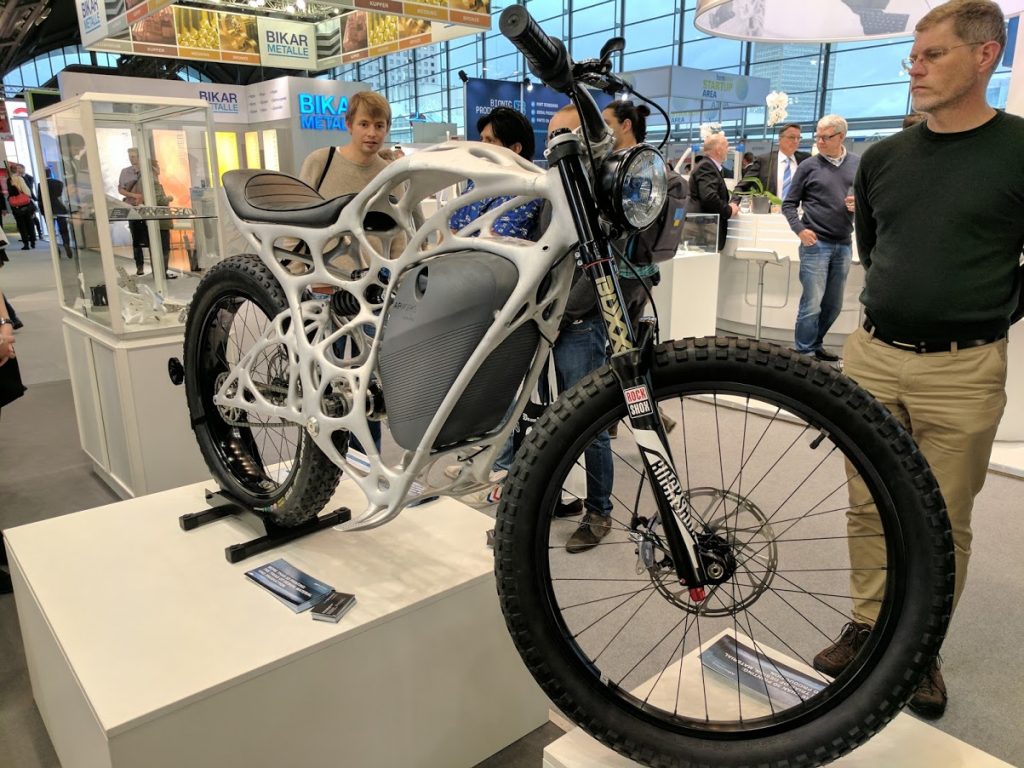Additive manufacturing will be used for large-scale production in the aerospace and defense industry under a newly announced collaboration between Dassault Systèmes and Airbus APWorks.
Dassault Systèmes are leaders in 3D design software, 3D Digital Mock Up and Product Lifecycle Management (PLM) solutions. Airbus APWorks is a subsidiary of Airbus and has customers in robotics, mechanical engineering, automotive, medical technology and aerospace. APWorks has previously used 3D printing to make functionally integrated and optimized parts with reduced weight and lead time.
The announcement comes as the aviation industry gathers in Le Bourget for the Paris Air Show.

The collaboration will see the Dassault Systèmes and APWorks grow the capabilities of the “Co-Design to Target” This is an, “integrated process that provides digital continuity for all engineering parameters across the value chain necessary for the additive manufacturing of a part.”
Dassault Systèmes cite the benefits of the co-design to target as follows:
- Proven, integrated program management keeps programs on-specification, on-budget and on-schedule
- Accelerate product architecture optimization in preliminary design with functional mock up
- Greener, Lighter, Stronger, Cheaper airframe with optimized value streams
- Reliable, optimized system network installation
- Live, multi-disciplinary simulations for execution to performance targets
APWorks bring their expertise in metal 3D printing to the collaboration. Joachim Zettler, CEO, APWorks explains, “The 3DEXPERIENCE platform is a first important step to replicable and scalable serial production. Simulation can help to predict and avoid part failures.”
Zettler adds, “The aviation industry is safety-oriented and new product introductions typically take time. With the virtual validation of the additive manufacturing process, we can expect certified serial additively manufactured parts.”
Making additive manufacturing replicable and scalable
Dassault Systèmes tell us the following about the project,
This will make the additive manufacturing process, from design optimization up to production, replicable and scalable. The next generations of aerospace parts are becoming lighter and more reliable thanks to additive manufacturing. As increasingly sophisticated designs, new high-performance materials and faster machines emerge, the use of additive manufacturing is extending beyond creative product design and prototyping to gain traction as one of the key industrial manufacturing processes worldwide.

Trends in the aerospace and defense sector need additive solutions
Analysis of trends in the aerospace and defense market illustrates a strong business case for the use of digital and additive technology. These trends include an increasingly global supply chain linking the large systems integrators – aka primes – who are responsible for the multitude of subsystems on an aircraft and the pushing of technology innovation further down the supply chain.
The competitive landscape in the aerospace sector also continues to evolve, with challengers to the established market participants now emerging.
Furthermore, with the aerospace and defense sector driven by technology the sector can often give indications as to how other markets may develop and adopt similar solutions in years to come.
The announcement by Dassault Systèmes and Airbus APWorks is intended to harness some of these trends. For example the end-to-end process will “deliver a single source of data to address upstream material design and downstream manufacturing processes and testing.” Dassault Systèmes adds,
The integration of 3D design combined with engineering and simulation optimizes parts for additive manufacturing, enables standardized parameters and therefore allows certification standards. Subsequent steps such as testing, optimization and additive manufacturing of a part can be matched to the identified parameters.
3D printing for “less waste, weight and costs”
Michel Tellier, Vice President Aerospace & Defense Industry, Dassault Systèmes says, “Virtual technologies and additive manufacturing are enabling the industrial world to do more with less waste, weight and costs, as well as freeing designers to explore complex shapes that could not be manufactured using traditional processes.” The VP adds,
Only by reducing the distance between real and virtual to zero can industry build and experience the future. Dassault Systèmes is joining efforts with leading-edge innovators in this field like APWorks to accelerate technology adoption in the industry.
Visitors to the 2017 International Paris Air Show can have the Dassault Systèmes 3DEXPERIENCE first hand from June 19-25 at booth E172 (hall 2B).
How will additive manufacturing change the manufacturing world? Let us know in the comments below. For all the latest information about 3D printing events then subscribe to our free newsletter. You can also follow our active social media accounts.



